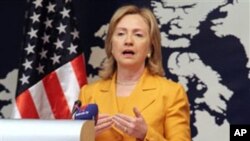U.S. Secretary of State Hillary Clinton said Friday she hopes Iran will come to big-power talks in Geneva Monday in a spirit of "constructive engagement" to allay international concern about its nuclear intentions. She spoke at a conference on regional security in Bahrain that included an Iranian delegation.
The privately organized "Manama Dialogue" conference gave Clinton a rare opportunity to address Iranian officials directly. And she told the audience that included Iranian Foreign Minister Manouchehr Mottaki that the Geneva meeting - the first of its kind since October of last year - gives Tehran an opportunity to show good faith and constructive engagement.
"The position of the international community is clear. You have the right to a peaceful nuclear program. With that right comes a reasonable responsibility: that you follow the treaty you signed, and fully address the world's concerns about your nuclear activities. We urge you to make that choice - for your people, your interests, and our shared security. We urge you to restore the confidence of the international community and live up to your international obligations," she said.
At Monday's meeting, senior diplomats of the five permanent U.N. Security Council member countries, including the United States, along with diplomats from Germany and the European Union, are expected to press Iran once again to accept a plan to export part of its enriched uranium stockpile as a confidence-building measure.
Iran initially accepted the idea of acquiring fuel for a Tehran research reactor in exchange for sending uranium abroad but later backed away.
In a question-and-answer session following her policy address to the Manama meeting, Clinton said Iran cannot expect to gain any regional advantage by pursuing what many experts believe is a covert nuclear weapons program. "If anyone in Iran believes that either acquiring nuclear weapons or the breakout capacity for nuclear weapons will make Iran stronger and more dominant in the region, that is an absolutely wrong calculation. Because it will trigger an arms race that will make the region less stable, more uncertain and cause serious repercussions far beyond the Gulf," she said.
Clinton said the Obama administration stands ready to continue a process of engagement with Iran, offered nearly two years ago, if there is what she termed "a sincere effort" by Tehran to deal with international concerns.
In her address to the conference, sponsored by the London-based International Institute for Strategic Studies, Clinton urged international and particularly Gulf Arab support for the democracy-building efforts in Iraq.
She also urged support for Lebanese sovereignty and independence, and for the U.N.-backed tribunal probing the 2005 assassination of Lebanese Prime Minister Rafik Hariri, which is expected to announce findings soon.
In an implicit reference to the Lebanon's Hezbollah movement which has been verbally attacking the inquiry, Clinton said that attempts to subvert justice by undermining the investigation are the threat to Lebanon's stability, not the tribunal itself.
Clinton Urges 'Constructive Engagement' by Iran in Nuclear Talks




